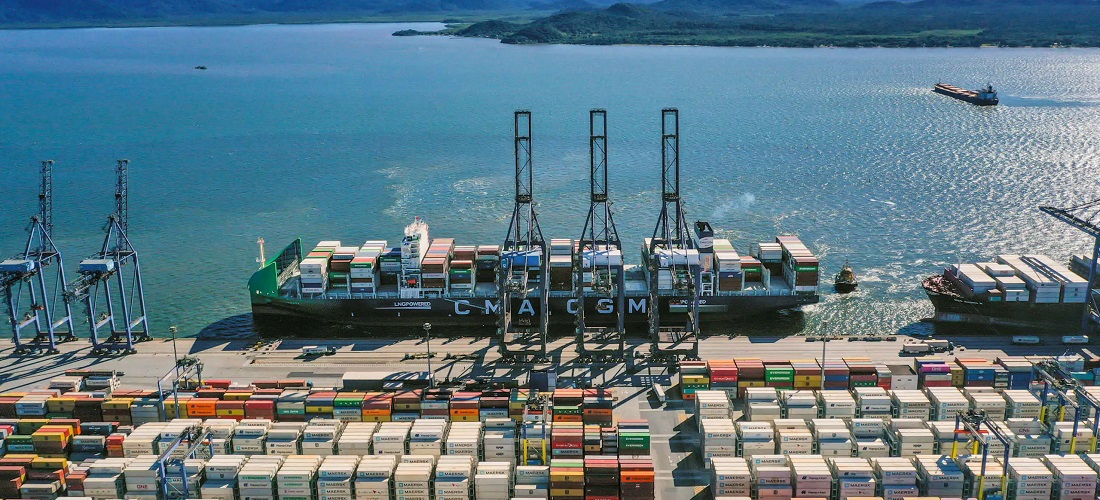
Brazil’s TCP Boosts Capacity, Enhances Sustainability with CMA CGM’s New LNG-Powered Ships
Jul, 03, 2024 Posted by Gabriel MalheirosWeek 202427
TCP, the company that manages the Paranaguá Container Terminal, received the container ship CMA CGM Buzios on Sunday (23), the first of a new generation of six “biomethane and e-methane ready” vessels with enhanced aerodynamics to serve Brazil in the weekly SEAS2 service, which connects Paranaguá to the Asian continent. These new ships stand out for their capacity and sustainable technology, in line with ESG principles.
The CMA CGM Group, a global player in sea, land, air and logistics solutions, already deployed on the route the CMA CGM BAHIA, BUZIOS, PARATY, SAO PAULO, BELEM, and will shortly add CMA CGM AMAZONIA. These are sister vessels named after iconic cities and states in the country and have the same characteristics: 336 meters long (LOA), 51 meters wide (beam), and capacity to carry 13,264 TEU (twenty-foot equivalent unit).
All the ships in this fleet emit 28% less greenhouse gases than conventional container ships, thanks to the exhaust gas recirculation system (ICER) and the fact that they are currently powered by Liquefied Natural Gas (LNG), and also “biomethane and e-methane ready”. In addition to their large capacity, the sister vessels attract attention because of their green color and windshield, a structure that extends above the bow, improving aerodynamics and increasing energy efficiency in their navigation.
“The operation of these ships with LNG propulsion is in line with our commitment to sustainability and innovation, contributing to a greener and more efficient future in the maritime transport sector and with the goal of the industry as a whole to reduce carbon dioxide emissions, promoting greater energy efficiency in maritime operations. In addition, this initiative meets an increasingly important demand from the market and our customers, who value sustainable and responsible practices.” celebrates Carolina Merkle Brown, TCP’s commercial manager for shipowners.
“The arrival of LNG-powered container vessels in Brazil marks the start of a new era in the Brazilian shipping industry, a transformative milestone which demonstrates our Group’s commitment to advancing the nation’s sustainable economic goals. This investment not only shows our unwavering commitment to exceed expectations but by deploying these state-of-the-art ships specifically designed for the Latam waters, we actively support our customers’ business and sustainable initiatives. With them, we will be able to cater for added volumes while significantly reducing the environmental footprint of our customer’s shipments. This not only aligns with their sustainability objectives but also plays a vital role in fostering a cleaner and more sustainable future for all” said Neusa Marcelino, CEO of CMA CGM Brazil.
Another highlight of the fleet upgrade is the increase in capacity for shipping through Paranaguá: CMA CGM’s 336-meter-long container ships are among the largest toregularly dock at the Terminal and exceed the average size of the vessels operating on this route previously, which were 299 meters long.
“The upgrade will contribute to the economic development of the regions covered by this service, as it will be the first service to serve two ports in Northern China, opening up major import and export opportunities in this area. Among the markets that should benefit most from the arrival of the larger vessels on this route are the export and import of frozen meat, electronics, auto parts and chemical and petrochemical products,” explains Carolina.
TCP has achieved consecutive productivity records and, in May 2024, reached the unprecedented mark of 136,201 TEUs handled in a single month. The expectation is for a year with new highs: on April 28, the Terminal achieved the feat of handling half a million TEUs 42 days earlier than in 2023, when 500,000 TEUs were recorded on June 9.
Investments in decarbonization
Last year, TCP completed the conversion of two RTG cranes used in the terminal’s rail operations, promoting a 95% reduction in CO₂ emissions in the operation of each machine and reducing the cost of maintenance of the equipment by 90%.
In the same year, the Terminal acquired a new electric bus with capacity for 80 passengers. The vehicle, used to transport employees around the 480,000 square meter operations yard, has a regenerative braking system and guarantees zero pollutant emissions.
-
Sugar and Ethanol
Feb, 22, 2023
0
Lineup of sugar exports in Brazilian ports grow
-
Ports and Terminals
Mar, 08, 2021
0
Handling at Rio Grande do Norte fell 18.78% in 2020
-
Ports and Terminals
Apr, 19, 2022
0
Antonina exports wood pellets in bulk, an exclusive event in Brazil
-
Ports and Terminals
Apr, 29, 2025
0
Three Containers Fall Off Ship at Port of Itajaí

